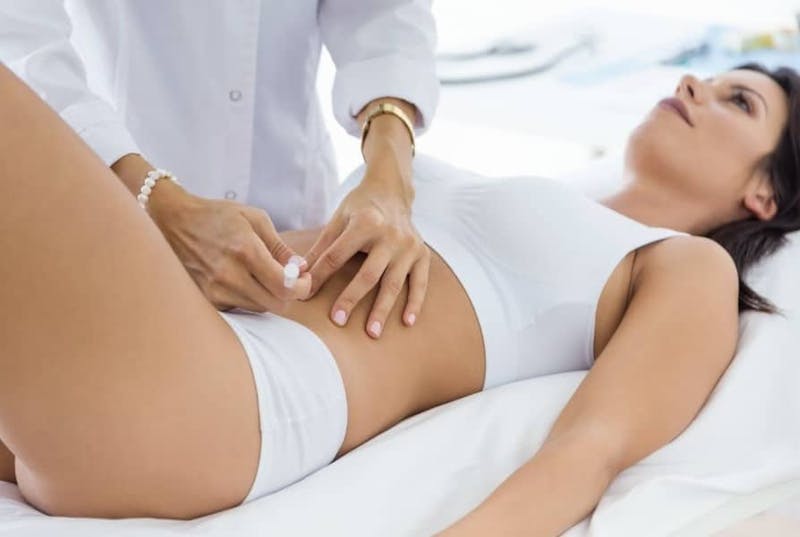
Liposuction safety is all about being a good candidate for surgery, finding the right provider, and following your surgeon’s pre- and post-surgery instructions. In this article, we’ll go over everything you need to know regarding the safety of liposuction and how to best prepare for your cosmetic surgery.
Safety Statistics of Liposuction
Overall, to remove excess fat via traditional liposuction is one of the most commonly performed plastic surgeries in the nation.
It is a surgical procedure that is associated with very few potential complications and helps with body contouring. In fact, according to the American Society of Plastic Surgeons, liposuction complications occur in fewer than 1 in 1,000 patients.
When complications do occur, they are almost always non-life-threatening. For instance, a recent study found that the most common complication post-surgery was fluid retention or collection (also called a seroma). This occurrence simply requires drainage to correct.
When Liposuction Risks Go Up
Studies do show that the more liposuction a patient has (the more volume or fat they have removed), the higher the risks. Likewise, patients with a higher BMI tend to have a slightly higher complication rate. This makes sense because those with a higher BMI will also likely get more fatty tissue removed.
Liposuction Is Generally Safe
With that said, your chances of developing a complication during or after liposuction are generally low.
This is especially true when you research and vet your surgeon, ensuring they are experienced and board certified, and when you ensure that you are a good candidate for the cosmetic procedure and are cleared by your surgeon to proceed with surgery.
How to Have a Safe Liposuction Procedure
Here are three ways to improve the likelihood of a safe and successful liposuction procedure.
1. Be a Good Liposuction Candidate
All potential liposuction patients must be examined by their plastic surgeon to determine whether they are a good candidate for surgery.
Your surgeon will need to go over your medical history, including any procedures you’ve had in the past, medical conditions you’ve had or currently have, and any medications or supplements you are taking. It’s important that you do not have a weak immune system.
In some cases, your surgeon may want to order additional tests. These may include imaging scans, blood labs, or other tests to ensure that you are healthy enough for surgery.
In addition to being healthy overall, good candidates for liposuction must also be within a healthy weight range (30% of their ideal bodyweight). Remember that liposuction removes excess fat deposits, but it is not a weight loss procedure, nor does it reduce excess skin or saggy skin. It is true that you will lose weight, but it is not the overall goal of the procedure.
Finally, patients must be non-smokers and have good skin elasticity. Liposuction works best on patients who have firm, elastic skin.
2. Choose a Qualified Plastic Surgeon
When choosing a plastic surgeon for body fat reduction with liposuction, it is essential to select a provider who not only has experience performing the type of liposuction you’re looking for (laser assisted liposuction, ultrasound assisted liposuction, VASER lipo, power assisted liposuction, suction assisted liposuction, etc.) but who is also board certified.
Not every medical professional who can legally perform plastic surgery is board certified. You want to find a board certified plastic surgeon because these professionals are the best in their field.
Board certification by the American Board of Plastic Surgery ensures that your surgeon has undergone the necessary rigorous training and skill-building for the job and has taken and passed the challenging oral and written exams. This is the gold standard for plastic surgery certification.
Naturally, you also want to know that your surgeon has good reviews from past patients who have undergone liposuction procedures with them. It can be a good idea to look for reviews from past patients online or to speak with friends or family who may have worked with the prospective plastic surgeon you are considering.
This will help give you a good idea of how they operate and the results they can achieve. Learn about the liposuction techniques they use, and watch out for worrisome outcomes such as uneven fat removal, blood clots or fat embolism problems, skin necrosis, etc.
3. Follow Your Surgeon’s Instructions
Lastly, it’s not just your plastic surgeon who’s going to determine the safety and success of your surgery. You are also a major player in this surgery, and it’s up to you to follow the instructions and directives given to you by your surgeon.
This means getting the necessary tests before surgery, stopping smoking if you are a smoker, eating a healthy diet and exercising before surgery, continuing on with a healthy lifestyle after surgery, wearing your compression garments, taking your medications as directed, getting enough sleep, etc.
All of these things will influence the success and outcome of your liposuction surgery, and naturally, they will contribute to the safety of your procedure as well.
FAQ: Liposuction
Is liposuction high risk surgery?
All surgeries come with risks, and liposuction is no exception. Still, overall, liposuction is extremely safe. It is performed regularly by nearly all types of plastic surgeons and can be used almost anywhere on the body.
It is an integral part of Brazilian butt lift surgeries and is also commonly performed alongside other procedures such as tummy tuck surgery, body lift procedures, and more.
Do liposuction results last?
For most patients, liposuction results are permanent (except for natural aging). Just make sure to continue on with a nutritional diet and exercise regularly. Try not to gain weight as this can cause poor skin elasticity and may reduce your results.
The fat cells won’t grow back but weight flucuations can lead to sagging skin and you may need to remove excess skin in the future.
What kind of anesthesia is used for liposuction?
Liposuction can be done under local, regional, or general anesthesia. There’s no proven superior technique; choice depends on procedure area, extent, and patient preference.
Does liposuction remove fat around abdominal organs?
Liposuction focuses solely on subcutaneous fat, not visceral fat around organs. It’s important to note its limitations for addressing protruding abdomens caused by visceral fat.
What is the safest liposuction method?
For safety and the fewest liposuction side effects after surgery, you want the liposuction procedure you choose to limit damage to blood vessels, maintain skin sensation, be easy to reduce swelling or fluid accumulation, and provide a quick and smooth recovery. Certain types of lipo can be hard on the body when removing fat cells.
Most sources agree that tumescent liposuction is the safest form of liposuction. This method can also provide excellent results for patients. With that said, any type of liposuction that your board certified plastic surgeon deems suitable for your treatment should be safe.
Schedule a Consultation Appointment
If you have additional questions about this plastic surgery procedure, including about the safety of liposuction, do not hesitate to contact our office and schedule a consultation appointment with Dr. Charles Galanis.
Board certified plastic surgeon Dr. Galanis would be happy to answer any of your questions and discuss more about liposuction with you. Contact us today to set up your appointment.


